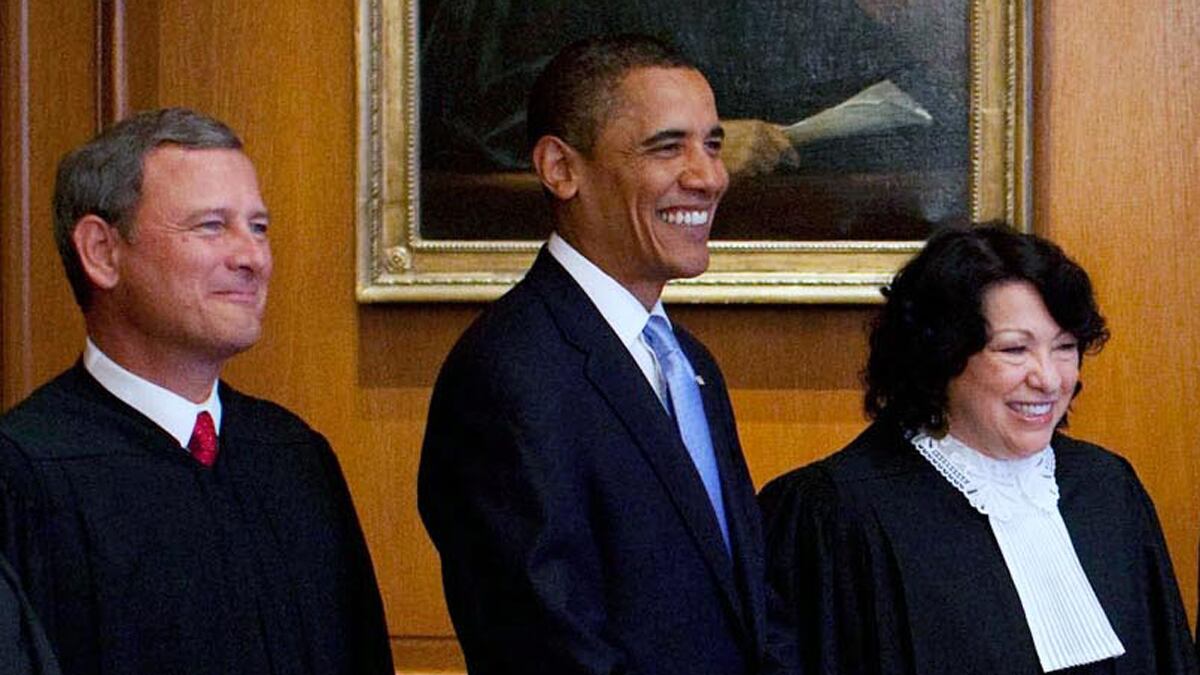Alexander Hamilton, in The Federalist Papers, described the judiciary as “the least dangerous” branch of government. It is also, apparently, the “most delicate.”

If you thought the justices of the Supreme Court, in their marble fortress, were pretty well-protected from what politicians, even presidents, say about them, you were wrong. We know this because President Obama’s comments this week about judicial restraint (he is for it) got a lot of commentators, across the political spectrum, upset on the court’s behalf.
Obama’s words, few and mild though they were, are being described as an “assault,” an “unprecedented” attack. Harvard Law School’s Laurence Tribe, a supporter of the president, worries that Obama is fueling “public cynicism.” Rush Limbaugh (not a supporter) called Obama a “thug” for “threatening” the court. Other conservatives have accused Obama of launching a “judicial witch hunt,” as if he had stepped up to the podium with pitchfork in hand, whispering strange tales of animals that grew deformed after contact with Justice Samuel Alito. We have heard this line of attack before: in 2010, when Obama, in his State of the Union address, had the audacity to mention the Citizens United ruling in the presence of the people who decided the case. Then, he was criticized for speaking up after the opinion had been issued, when the gentlemanly thing to do was just to accept the result. Now, he is being rebuked for addressing the issue in advance.
The right’s indignation, plainly, has less to do with solicitude for the justices than with hostility toward the president and his purposes. It reflects a determination to shut or shout down the president any time he dares speak of the court. Conservatives have long dominated the national discussion about the courts and Constitution and do not intend to yield the floor. It is therefore encouraging that Obama has refused to back down. At a press luncheon Tuesday, he again expressed his confidence that the justices will “abide by well-established” precedents.
Let’s hope Obama has more to say on the subject—whatever the court decides on the Affordable Care Act. It is not only acceptable, but essential, for presidents to tell us what they think about the role of judges and the meaning of the Constitution. Presidents don’t get the last word, but they must get their say. And historically, they have.
Despite conservatives’ claims that they “can’t recall anything like this,” Obama is not breaking new ground. Franklin Roosevelt’s battle with the court over the fate of the New Deal is only the most well-known example: in 1935 after a unanimous Supreme Court struck down the National Industrial Recovery Act—the centerpiece of the New Deal’s economic policy—FDR dissected the court’s opinion for nearly an hour and a half in an Oval Office press conference. “The big issue is this,” he told reporters. “Does this decision mean that the United States government has no control over any national economic problem?” Yes, he continued, that was just what it meant, adding that the court had created “a perfectly ridiculous and impossible situation”—one he tried to remedy, two years later, with his plan to pack the court.
Ronald Reagan, for his part, remade the federal judiciary the old-fashioned way: by filling the bench with appointees who shared his philosophy. Toward that end he spoke forcefully, and often, about that philosophy, including the need for judges “who don’t confuse the criminals with the victims; judges who don’t invent new or fanciful constitutional rights for those criminals; judges who believe the courts should interpret the law, not make it; judges, in short, who understand the principle of judicial restraint.” In words echoed by Obama this week, Reagan reminded Americans that “in our democracy, it is the elected representatives of the people, not unelected judges, who make laws.” And Reagan warned what would happen if justices ignored that civics lesson: “If that happens,” he said, “the words of the documents that we think govern us will be just masks for the personal and capricious rule of a small elite.” Sharper words, certainly, than we heard from Obama this week.
This is not to suggest that anything goes, rhetorically speaking, with respect to the court. There is a line somewhere between plain-spokenness and demagogy, probably a bright one, and presidents should be careful not to cross it. Obama, by historical standards, has not come close. He deserves more latitude than his critics (and some concerned supporters) are giving him. He deserves this not out of deference to his office, but because the public needs to hear more, not less, about what he really thinks. Presidents, like the rest of us, have views about what a judge’s role should or shouldn’t be, what the Constitution does or doesn’t permit, what concepts like “liberty” mean. We need to know what Obama’s views are, because they count more than ours do; presidents actually get to appoint judges who agree with them.
What’s relevant, then, about Roosevelt’s example, and to a lesser extent Reagan’s, is not his willingness to talk tough about the court; it’s his eagerness to engage in an extended discussion about the Constitution. FDR wasn’t expecting to influence the court, at least not directly. He was trying, in the main, to educate the public. In Roosevelt’s view, the Constitution was not the sole province of black-robed judges; it belonged to us all. It was, he said frequently, “a layman’s document, not a lawyer’s contract.” And so he spoke on many occasions—at length and in detail and without apology, when big New Deal cases were on the court’s docket and when they were not—about what he saw as the “original broad concept of the Constitution” and the authority it granted the government to apply national solutions to national problems, the power it conveyed to make the American experiment succeed.
Obama, more a reluctant than a happy warrior, has been conscripted into what FDR called the “unending struggle” against those who “cry ‘unconstitutional’ at every effort to better the condition of our people.” That struggle will continue whether the court upholds or upends the health-care law, because it is one of the defining conflicts in our national life. The bully pulpit awaits.






